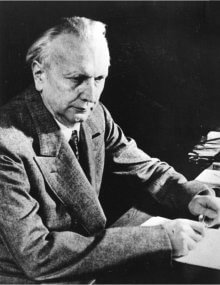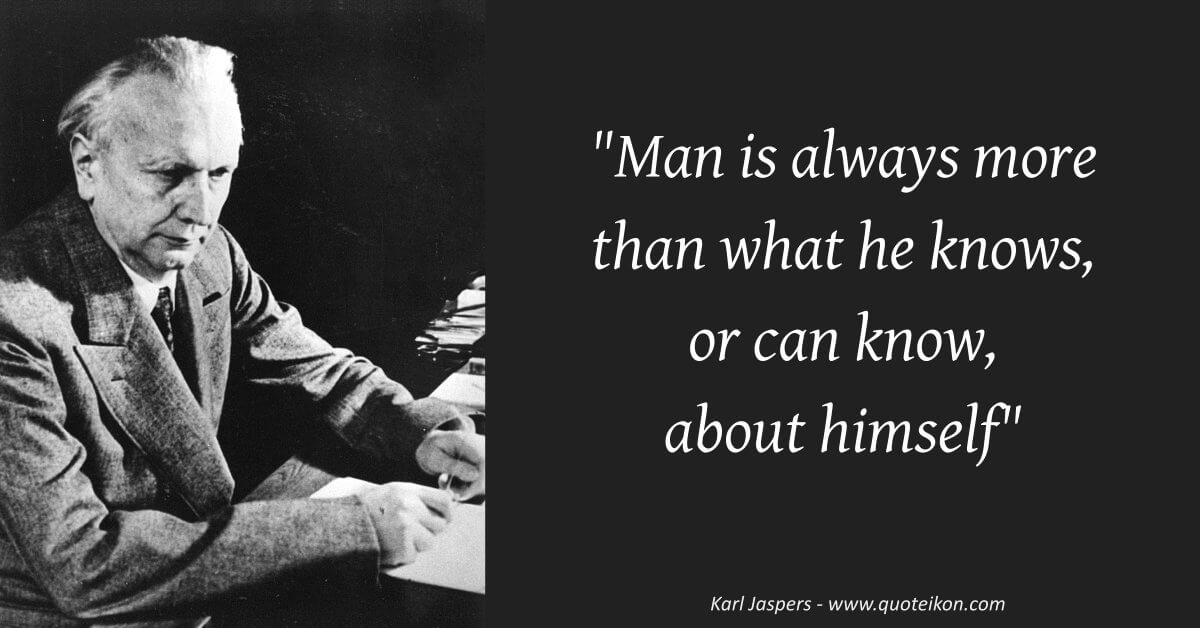
- Mini Bio
- Name: Karl Theodor Jaspers
- Born: 23rd February 1883, Oldenburg, German Empire
- Died: 26th February 1969, Basel, Switzerland
- Resting place: Friedhof am Hörnli, Riehen, Switzerland
- Alma Mater: University of Heidelberg
- Occupation: Psychiatrist and Philosopher
- Era: 20th-century philosophy
- Region: Western philosophy
- Notable ideas: Axial Age and Theory of Communicative Transcendence
- Institutions: The University of Heidelberg and the University of Basel
- Marriage resume: Gertrud Mayer 1910-1969 (his death)
- Influenced by: Baruch Spinoza, Friedrich Nietzsche, Georg Wilhelm Friedrich Hegel, Immanuel Kant, Martin Heidegger, Max Weber, Meister Eckhart, Nicolaus Cusanus and Søren Kierkegaard
- Inspired: George Ostrogorsky, Hannah Arendt, Hans-Georg Gadamer, Heinrich Blücher, Jacob Marschak, Paul Ricœur and William A. Earle
"That which has happened is a warning. To forget it is guilt. It must be continually remembered. It was possible for this to happen, and it remains possible for it to happen again at any minute. Only in knowledge can it be prevented"
Karl Jaspers"While I was still at school Spinoza was the first. Kant then became the philosopher for me and has remained so ... Nietzsche gained importance for me only late as the magnificent revelation of nihilism and the task of overcoming it"
Karl Jaspers"We incline to doctrinism. What makes it worse is that so many people do not really want to think. They want only slogans and obedience. They ask no questions and they give no answers, except by repeating drilled-in phrases"
Karl Jaspers"We cannot avoid conflict, conflict with society, other individuals and with oneself. Conflicts may be the sources of defeat, lost life and a limitation of our potentiality but they may also lead to greater depth of living"
Karl Jaspers"The 'public' is a phantom, the phantom of an opinion supposed to exist in a vast number of persons who have no effective interrelation and though the opinion is not effectively present in the units"
Karl Jaspers"In psychopathology it is dangerous merely to learn the matter, our task is not to ‘learn psychopathology’ but to learn to observe, ask questions, analyze, and think in psychopathological terms"
Karl Jaspers"I approach the presentation of Kierkegaard with some trepidation. Next to Nietzsche, or rather, prior to Nietzsche, I consider him to be the most important thinker of our post-Kantian age"
Karl Jaspers"When the titanic apparatus of the mass-order has been consolidated, the individual has to serve it, and must from time to time combine with his fellows in order to renovate it"
Karl Jaspers"Our questions and answers are in part determined by the historical tradition in which we find ourselves. We apprehend truth from our own source within the historical tradition"
Karl Jaspers"The more determinedly I exist, as myself, within the conditions of the time, the more clearly I shall hear the language of the past, the nearer I shall feel the glow of its life"
Karl Jaspers"One who would influence the masses must have recourse to the art of advertisement. The clamour of puffery is to-day requisite even for an intellectual movement"
Karl Jaspers"Nietzsche, driven by the absolute demand of his existential truthfulness, could not abide the bourgeois world, even when its representative had human nobility"
Karl Jaspers"Reason is like an open secret that can become known to anyone at any time; it is the quiet space into which everyone can enter through his own thought"
Karl Jaspers"Our own power of generation lies in the rebirth of what has been handed down to us. If we do not wish to slip back, nothing must be forgotten"
Karl Jaspers"Philosophy means to be on the way. Its questions are more essential than its answers, and every answer becomes a new question"
Karl Jaspers"I am optimistic, provided world history does not just roll over us and destroy us. We still have young people eager to learn"
Karl Jaspers"Phenomenology is for us purely an empirical method of inquiry maintained solely by the fact of patients’ communications"
Karl Jaspers"When language is used without true significance, it loses its purpose as a means of communication and becomes an end in itself"
Karl Jaspers"Man is always something more than what he knows of himself. He is not what he is simply once and for all, but is a process"
Karl Jaspers"The masses are our masters; and for every one who looks facts in the face his existence has become dependent on them"
Karl Jaspers"There is no limit to the discovery of causes and with every psychic event we always look for cause and effect"
Karl Jaspers"What is today obvious to all is a decay in the essence of art. ... the opposition to man's true nature as man"
Karl Jaspers"Man, if he is to remain man, must advance by way of consciousness. There is no road leading backward"
Karl Jaspers"No one is guiltless...But no one is beyond the pale of human existence, provided he pays for his guilt"
Karl Jaspers"The teacher of love teaches struggle. The teacher of lifeless isolation from the world teaches peace"
Karl Jaspers"All thoughts, could be judged by this touchstone question, do they aid or hinder communication"
Karl Jaspers"Imminent seems the collapse of that which for millennium has constituted man's universe"
Karl Jaspers"The essence of philosophy is not the possession of the truth but the search for truth"
Karl Jaspers"Even the most elevated psychological understanding is not a loving understanding"
Karl Jaspers"We are sorely deficient in talking with each other and listening to each other"
Karl Jaspers"Philosophy seemed to me the supreme, even the sole, concern of man"
Karl Jaspers"Man is always more than what he knows, or can know, about himself"
Karl Jaspers"The psychologist who looks for meaning will find content essential"
Karl Jaspers"Yearning may crush me when I stay behind alone"
Karl Jaspers"Truth is what really unites us"
Karl Jaspers
Great quotes are not where you find great wisdom. It's where you share this knowledge that counts
Sharing Is Caring
The Legacy of Karl Jaspers
The Science of Uncertainty
Jaspers was an existentialist who embraced the feelings of uncertainty as he believed it unshackled human existence. He recognised that it was futile to rationalise uncertainty as it was a condition to be understood rather than to be overcome.
Live and let live by embracing uncertainty rather than raging against it. He argued that the rise of the individual can only traverse through the path of uncertainty to gain traction with spiritedness, intellectuality and vitality, it is the essence of freedom, truth and justice that defines people by what they are not or not yet.
Moral authority
Few men in post WWII Germany held a moral authority in such high esteem as Karl Jaspers. He had been persecuted by the Adolf Hitler Nazi regime yet he still chose to remain in Germany despite losing his position as a highly celebrated professor of philosophy at the University of Heidelberg.
Post war, he was offered to serve as the minister of culture, but he declined and chose to follow his preferred path as encompassing the philosophical life of a scholar.
In an effort to help Germans confront their past, he wrote The Question of German Guilt (1946) where he broached the sensitive subject of political guilt which was essentially a proverbial prison of the mind that needed to be unlocked and discussed rationally. All German survivors of the Nazi era were to bear an equal responsibility which would become known as a collective guilt and this would become the lasting legacy of Karl Jaspers.
Quotes About Karl Jaspers
The political philosopher Hannah Arendt was in agreement with Jaspers about Marxism: "I’m preparing my Princeton lectures and a lecture for Harvard. At Princeton I’ll talk about Marx in the tradition of political philosophy. The more I read Marx, the more I see that you were right. He’s not interested either in freedom or in justice"
Hannah Arendt went on to share this observation: "the only successor … Kant has ever had"
The author Ronny Miron expressed this opinion: "Jaspers' search was inspired by a constant experience of dissatisfaction, which directed the self to transcend every present understanding of the self and to look for an improved one"
The philosopher Kurt Hoffman shared this assessment: "Jaspers’ primary concern is to resist the tendency of making one of the spheres absolute and to subject the others to its logic and its laws. Philosophy must avoid the pitfalls of materialism and biologism as well as those of pan-psychism and radical existentialism"
His former student Golo Mann described his moral authority in post WWII Germany as Jaspers: "had not spoken or, so long as he was still allowed, published a single word that might have been interpreted as support for tyranny"
The scholar István Király V made this observation: "Jaspers is not constrained by his Westernness, he does not want to get rid of it and become Eastern in his spirit. But for a decision made at this level it is necessary to keep the ciphers floatating, not going beyond them."
The author James Collins gave this appraisal: "Jaspers himself remained unconvinced by the scientific pretences of the reigning philosophies, especially positivism and idealism"
The researcher Tsutomu Kumazaki shared this view: "Jaspers did not mean that understandable psychic phenomena were not amenable to causal explanation"
The writer Alexander Linklater talked of his understanding of madness: "The German philosopher-psychiatrist Karl Jaspers had distinguished between two kinds of madness: that which could be understood, and that which could only be explained"
The philosopher Walter Kaufmann spoke of the influence of Kant: "Jaspers is too often seen as the heir of Nietzsche and Kierkegaard to whom he is in many ways less close than to Kant ... the Kantian antinomies and Kant's concern with the realm of decision, freedom, and faith have become exemplary for Jaspers. And even as Kant "had to do away with knowledge to make room for faith," Jaspers values Nietzsche in large measure because he thinks that Nietzsche did away with knowledge, thus making room for Jaspers' philosophic faith"
The German explorer Heinrich Barth described him thus: "The first and the last Kantian"
The scholar Jeffrey M. Dudiak shared these thoughts: "Much of his work, and particularly much of his later work, specifically addressed this new world situation and sought to find a ground upon which humanity could found itself as a co-humanity and thereby avoid the disasters of nuclear confrontation, totalitarianism, and dehumanization that Jaspers believed the use of the new technologies made possible"
The author José Manuel Heleno opined this comparison: "There is a conceptual thread gathering the philosophy of Plato, Nishida Kitaro and Karl Jaspers. In all the mentioned authors we find this 'third kind' (Plato) which is not possible to fully understand with reason or determine it clearly. This 'third kind' - the Greek khora , like Plato says -, the absolute nothing according to Nishida, the encompassing in Jaspers' theory, the horizon of horizons, is the other side of the philosophy that we should scrutinize from east to west"

